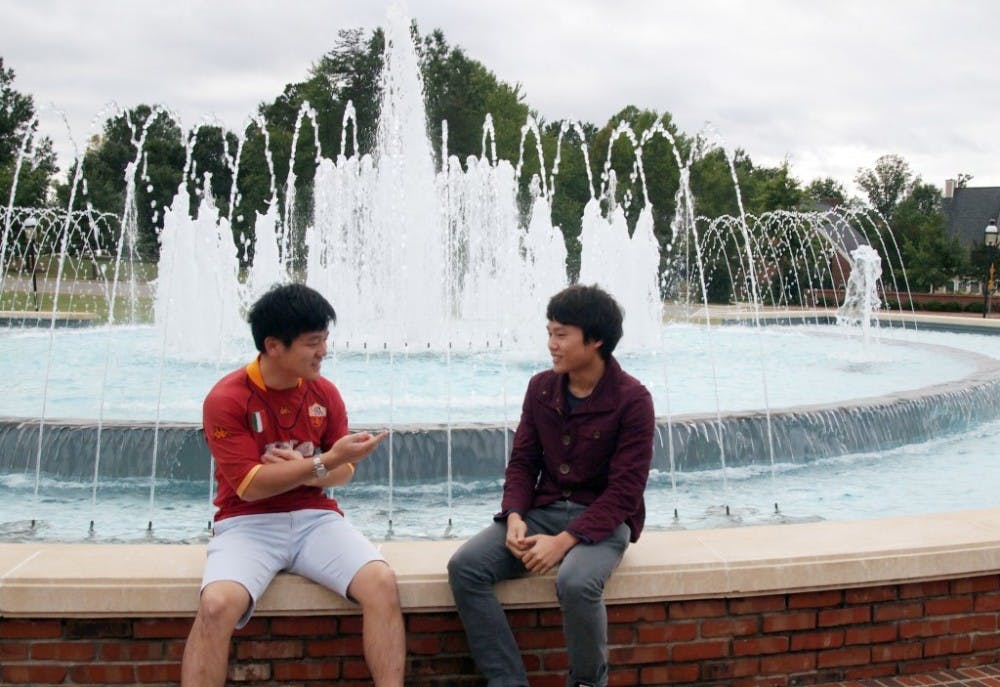Takasuke Tsuji arrived at the Raleigh-Durham International Airport Aug. 19. He had been on an airplane for nearly 24 hours, but he was almost at his destination: Elon University. He knew he was in the United States the moment he saw cars driving on the right side of the road. In his home country, Japan, drivers drive on the left.
Elon’s global exchange program introduces international students to the culture and academics of Elon. Having spent his first two years of college at Kansai Gaidai University in Osaka, Japan, Tsuji, a Kyoto native, eagerly arrived this semester, passionate about strategic communications and ready to immerse himself in the English language.
Since he arrived last month, Tsuji has noted many cultural differences.
“When someone sneezes, you say, ‘Bless you,’” Tsuji said. “When people sneeze more than once, you say, ‘Bless you, bless you, bless you.’ In my country, no one says anything.”
Tsuji chose Elon because it offered both a marketing major and a communications major.
Coming from such a different culture, Tsuji has experienced many difficulties adjusting to Elon’s way of life. For example, he said he must be more assertive in classes to earn participation points. “Students hardly talk during lectures at Japanese universities. It’s seen as embarrassing,” he said. “Here, students talk very much.”
Tsuji’s professors have worked with him in his transition to Elon.
“While I am sure he has some adjusting to do, I am going to guess he is in no way intimidated by his current surroundings,” said Daniel Haygood, Tsuji’s Communications in the Global Age professor. “I do not sense any real hesitation at all in his willingness to speak or contribute.”
The United States appealed to Tsuji because the English language fascinated him. He said he realized his passion for English after participating in a semester-long homestay study period in Malaysia during high school. He wants to speak English to sound like Hollywood action movie stars, whom he has always admired.
“Hollywood actors are cool,” he said. “It’s kind of neat if you can speak their language.”
Tsuji added he still struggles to understand some parts of the language, especially in detailed discussions and during fast-paced conversations.
Though he is always trying to practice English, he said he speaks his native Japanese with older Japanese students on campus, especially senior Atsushi Hiyakawa. He does this as a sign of respect. Unlike American culture, respect for one’s elders in Japanese culture includes all people, even people only a year older.
“I have to be polite to Atsushi,” Tsuji said. “In English, we are both equals, so that makes things awkward.”
Hiyakawa was in the same exact position as Tsuji last year. He was a junior who had just arrived at Elon from Kansai Gaidai. He did not have many friends, felt left out in classes and conversations and struggled to adapt to a culture so unlike his own. Hiyakawa said he feels more confident and comfortable a year later.
“I know how life here works now. For example, I learned how the BioBus works and how to print at the library,” Hiyakawa said.
“I’m not confused anymore.”
Hiyakawa said he has acted as a mentor to the new Japanese transfer students. He plays ping pong with them on the weekends, introduces them to his American friends and teaches them about other campus resources.
Hiyakawa said he hopes Tsuji and the other exchange students can become as comfortable as he has become.
“I’ve become more expressive and talkative,” Hiyakawa said.
Hiyakawa also noted that making friends early was the most important thing for him to do last year. He hopes Tsuji can do the same.
Junior Tony Weaver, one of Tsuji’s friends at Elon, is confident Tsuji will fit in well on campus.
“I think that Takasuke is adjusting well to Elon,” he said. “He is a nice person and is making a lot of friends.”
Tsuji knows there are difficulties he has to face both culturally and linguistically, but he is satisfied with his decision to study at Elon.
“I’m just happy being in an environment where I can actively learn English,” he said.
A year removed from Kansai Gaidai, Hiyakawa knows coming to Elon was one of the best choices he has made and has learned to see things from many new perspectives.
One of these new perspectives relates to peoples’ work habits.
“When people work in Japan, they look tired,” Hiyakawa said. “American people are more relaxed. Everyone here works, but they look happy.”
Overall, Hiyakawa said he feels more globally aware. “This experience at Elon is very beneficial for my life,” he said.
Hiyakawa said Tsuji will become more comfortable on campus as the semester continues. He offered some of advice to Tsuji, “Elon is not as easy as college life at Kansai Gaidai, but it’s advantageous for your life.”


